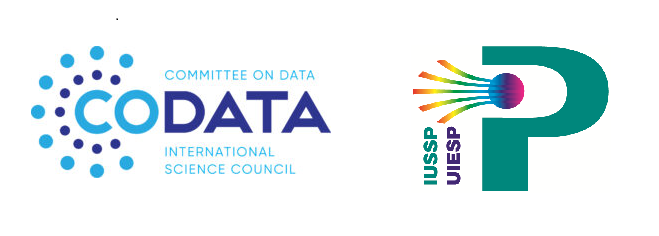 On 12 June 2023, IUSSP and CODATA, sponsored a webinar on the publication of FAIR Vocabularies in Population Research https://doi.org/10.5281/zenodo.7818157. This new report explains the benefits of making data “Findable, Accessible, Interoperable, and Reusable” (FAIR) and recommends ways to apply these principles in population research.
On 12 June 2023, IUSSP and CODATA, sponsored a webinar on the publication of FAIR Vocabularies in Population Research https://doi.org/10.5281/zenodo.7818157. This new report explains the benefits of making data “Findable, Accessible, Interoperable, and Reusable” (FAIR) and recommends ways to apply these principles in population research.
Speakers, Presentation and Recording
- Simon Hodson, CODATA, Introductions and Welcome: why this is important for CODATA and data more generally
- George Alter, University of Michigan, FAIR Vocabularies in Population Research
- Abdulla Gozalov, United Nations Statistics Division, Statistical Data and Metadata eXchange (SDMX)
- Steven McEachern, Australian Data Archive, Australian National University, FAIR Vocabularies in Data Collection and Management
- Edith Gray, IUSSP Council Member, Why this is important for IUSSP and next steps, what IUSSP will do with the recommendations
- Discussion, chaired by Arofan Gregory, CODATA and DDI Alliance
The presentation slides are available here.
The Working Group
The joint IUSSP-CODATA Working Group on FAIR Vocabularies brought together 25 scientists in the fields of demography and data science, who met twice a month for two years to study how population research can apply the rapidly developing standards and technologies associated with the FAIR principles. Co-chaired by George Alter (University of Michigan), Arofan Gregory (DDI Alliance/CODATA) and Steven McEachern (Australian National University), the working group benefited from the strong support of IUSSP leadership and the participation of Simon Hodson, Executive Director of CODATA.
The Report
Demography is an empirically focused field with a long tradition of widely shared, easily accessible, data collections. Although demographers benefit from many excellent sources of data, combining data from multiple collections is often a time-consuming manual task. The FAIR principles (Wilkinson et al., 2016) aim to make data “Findable, Accessible, Interoperable, and Reusable” by both humans and machines. FAIR vocabularies, which allow machines to associate data with concepts, will save hours of tedious work by automating processes of data discovery and harmonization. FAIR Vocabularies in Population Research introduces readers to international standards for documenting data (metadata) that underlie international infrastructures for producing and disseminating demographic data, and it recommends enhancing these services through application of the FAIR principles. The key recommendation for IUSSP is publication of a FAIR Vocabulary of Demography, an authoritative online vocabulary for population research. There are also recommendations for SDMX and for the DDI Alliance to improve the functioning of the most important metadata standards and their alignment with the FAIR principles. The report recommends that CODATA invites similar activities in other research areas and contribute to the development of recommendations on governance and sustainability of FAIR vocabularies.
The Webinar
Speakers presented the report and discussed the next steps for implementing its recommendations. Online vocabularies already exist in many disciplines, and many of them define demographic terms in ways incompatible with demography. Population research will be at a disadvantage without an authoritative FAIR vocabulary of its own. Fortunately, a new FAIR Vocabulary of Demography can build upon IUSSP’s long history of support for dictionaries of demography in multiple languages. The webinar also highlighted recommendations for international organizations that collect and publish statistics, like the UN and OECD, and for applying FAIR principles at all stages of data collection in surveys and other data collection projects.
Next Steps
The IUSSP will create a Standing Committee to oversee and maintain a FAIR vocabulary for population research, providing authoritative definitions of demographic terms in a form consistent with emerging standards.
In a second stage, the IUSSP will seek partners with the technical capabilities required to create a FAIR online platform for the Vocabulary.
